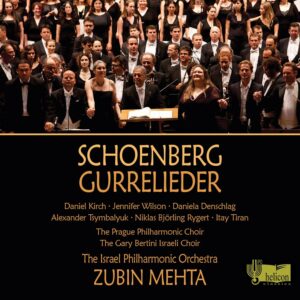Slow tempos characterize the first half of Zubin Mehta’s Gurrelieder (his second recorded version; the first was with the New York Philharmonic for Sony). Of course, there have been other slow-and-intense performances (the recent Gielen, for one) but Mehta’s merely drags. And he’s not helped by the notoriously drab acoustics of Tel Aviv’s Mann Auditorium, while the live recording’s odd balances yield little, if any aural pleasure.
As Waldemar, Daniel Kirch performs respectably in the first song, but “Ross! Mein Ross!” reveals the limitiations of his vocal technique–mainly an insecure upper range with thin and shouty high notes. He’s not redeemed by soprano Jennifer Wilson, whose shaky-voiced Tove gives little indication of the allure that so captivates Waldemar.
Predictably, Mehta summons a good deal more energy for Part 3, especially in the rollicking “Night Ride” song, but much of Schoenberg’s brilliant orchestral writing is obscured by the closely-miked voices. The Israel Philharmonic delivers a performance that, while thoroughly professional, lacks the virtuosity of rival recordings (particularly those by the Boston Symphony, Vienna Philharmonic, and Philharmonia Orchestra). The choral forces are excellent.
Niklas Bjorling Rygert is a suitibly colorful Klaus-Narr, while speaker Itay Tiran is mildly intersting but pales in comparison to the captivating Lorenz Fiedler for Kubelik. The performance’s best moment is the beautifully done, resplendent “sunrise” conclusion–far more involving than what precedes it.
Mehta has some good ideas about Schoenberg’s Verklärte Nacht (which follows the Gurrelieder on Disc 2), but he’s again hampered by the harsh, tubby, and echo-ridden recording, which lends the Israel strings a mushy timbre that occasionally blurs intonation. When all goes well, Gurrelieder can be a magical musical experience. That’s not the case here. Those who prefer a slow, dreamy approach should seek out Gielen’s better sung, played, and recorded performance. Otherwise, go for Ozawa’s compelling (and now classic) version. (And if you’re the adventurous type, search for the Inbal/Frankfurt recording on Denon.)
































